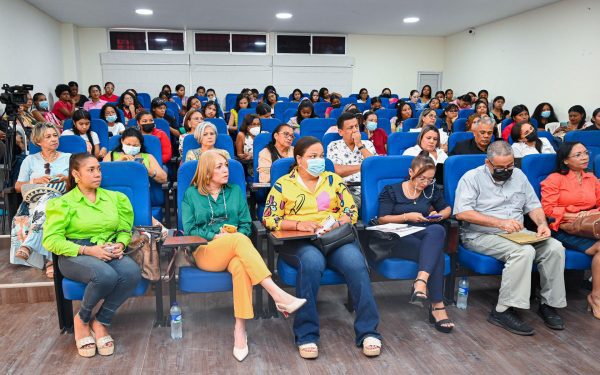
In a hybrid fashion, the symposium was held in the facilities of the University of La Guajira: Education with Quality for Transformation in Contexts of Uncertainty, an initiative led by the Early Childhood Education Program and the Tepiche Research Group. The academic day is framed within the International Symposium IX on Education, Teacher Training and Pedagogical Practice in Contexts of Uncertainty, for the Ph.D. in Educational Sciences at Simon Bolivar University.
The session was attended by speakers Hilda Schulze Almazu, Doctor of Educational Sciences and Academic Director of the Master’s Degree in Educational Administration and Management at Uniguajira. Miriam Ortiz Padilla, Professor and Director of the Doctorate of Educational Sciences at Simón Bolívar University and Gabriel Argota Caicedo, PhD in Humanities and President of the San Antonio de Arimacien-Manor Institute for Indigenous Technical Education.
Teacher Schulze Almazo opened today with a message toward provocation and dialogue, meaning going beyond the discourse of complaint and claim in the educational sector. The academic insisted that “the time has come to start building a more comprehensive, reflective and meaningful analysis of what quality education is. If no attempt is made to understand and bridge the educational gap in terms of the process, the reality in La Guajira Province will not change.”
In a hybrid fashion, the symposium was held in the facilities of the University of La Guajira: Education with Quality for Transformation in Contexts of Uncertainty, an initiative led by the Early Childhood Education Program and the Tepiche Research Group. The academic day is framed within the International Symposium IX on Education, Teacher Training and Pedagogical Practice in Contexts of Uncertainty, for the Ph.D. in Educational Sciences at Simon Bolivar University.
The session was attended by speakers Hilda Schulze Almazu, Doctor of Educational Sciences and Academic Director of the Master’s Degree in Educational Administration and Management at Uniguajira. Miriam Ortiz Padilla, Professor and Director of the Doctorate of Educational Sciences at Simón Bolívar University and Gabriel Argota Caicedo, PhD in Humanities and President of the San Antonio de Arimacien-Manor Institute for Indigenous Technical Education.
Teacher Schulze Almazo opened today with a message toward provocation and dialogue, meaning going beyond the discourse of complaint and claim in the educational sector. The academic insisted that “the time has come to start building a more comprehensive, reflective and meaningful analysis of what quality education is. If no attempt is made to understand and bridge the educational gap in terms of the process, the reality in La Guajira Province will not change.”

In his opinion, “the problem is not solved by building educational institutions, by training teachers, by donations of school supplies, libraries or smartphones. As long as we do not give ourselves the task of truly understanding the context of our education quality, we will continue in the same vein.”
On her part, Myriam Ortiz Padilla, speaking on Thumbelina, explained the tensions and challenges in her training, that it is appropriate not to ignore the impact of the Internet and the knowledge society at this historical moment, otherwise “we teachers and we in their role as trainers will guide and favor human development for a generation that describes the world through their thumbs.” implying new ways of knowing.” During his analysis, he proposed three scenarios, the first learning independence, the second his own learning path, and finally recognizing “Thumbelina or Tom Thumb” as a self-constructing, but also reality-enhancing being.
Finally, Gabriel Argota Caicedo focused his treatise on intercultural education and uncertainty on building his own knowledge. In his speech, he said that skepticism has always been present and has been most evident in times of the COVID-19 pandemic. With regard to multiculturalism, he admitted that “being able to see each other from one angle and another, is the dialogue between equal selves that did not happen in Wayuu communities with Arijunas. It is not a construction of a Western reality, so it is necessary to start building a vision of who we are and what La Guajira County has.” in its ethnic wealth, its uses, and its customs.”
President Doris Escobar
Uniguajira journalist

:quality(85)/cloudfront-us-east-1.images.arcpublishing.com/infobae/TEQF6EONZRFGLLLDIDD4L2O4EE.jpg)

:quality(75)/cloudfront-us-east-1.images.arcpublishing.com/elcomercio/XU32LRAEZFDDPNVHLFU3CKVBYY.jpg)




More Stories
Venezuela ranks fourth in female leadership in science and technology in Latin America
In Portuguesa and Sucre they explore the wonderful world of science
The university court overturns the expulsion of two teachers and a chemical sciences student